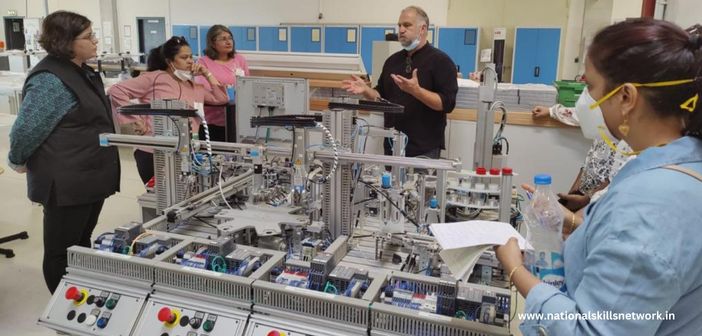“The government of India is dedicated to making India Atmanirbhar (self-reliant) and has the vision to make India the Skill Capital of the world. To support this, all of us need to strive towards making “Skill India”, a “Will India”, says Dr. Abhilasha Gaur, COO and officiating CEO, Electronics Sector Skills Council of India (ESSCI).

To learn more about the initiatives from the Electronics Sector Skills Council of India (ESSCI), current trends in the electronics industry, the need for skill development, and emerging job roles in the industry, among others, we spoke with Dr. Abhilasha Gaur, COO and officiating CEO, Electronics Sector Skills Council (ESSCI).
Below are a few excerpts from our conversation. You can watch the full video interview on our YouTube channel.
The impact created by ESSCI
“We reached our 10-year milestone in December 2022. Since our inception in December 2012, approximately 17.5 lakh candidates have received training and certification in a wide range of job roles. Training has reached nearly 522 districts, and numerous operations were carried out not only in the tier-2 and tier-3 urban areas but also in the rural areas,” said Dr. Abhilasha Gaur.
Revamping Qualification Packs (QPs) to meet the Industry demand
“We used to have over 152 qualifications, but now we have revamped the entire qualification process. As of now, we have 88 qualifications, of which 30 are new, 56 have been revised, and about 5 have been rationalized to meet the demands of the industry. It is important to keep these qualifications up to date.”
“In 2023, our main focus will be to continue revising qualifications in accordance with industry requirements, add different qualifications at different levels as needed, and also meet the National Education Policy (NEP) 2020 requirements,” added Dr. Abhilasha Gaur.
Sub-sectors under ESSCI
The primary purpose of ESSCI is to serve as a bridge between academia and industry.
Therefore, the sector has been divided into nine sub-sectors:
- Consumer electronics and IT hardware
- Industrial automation
- Pcp design
- Manufacturing
- Security surveillance
- EMS
- e-mobility
- Communication and broadcasting
- Semiconductor and components
“We are planning to add one more sector, the Wearable and Hearable sector, in the coming years, and we have recently finished our skill gap study. Later, strategic electronics could be another sector to consider in the coming years,” said Dr. Abhilasha Gaur.
Industry partnerships of ESSCI
ESSCI collaborated with Samsung India and took up a couple of projects –
- Samsung DOST (Digital and Online Skill Training): Trained 200 candidates in 40+ centres across India. Once the student completes training, they go on a 5-month paid internship.
- Samsung Innovation Campus: Samsung Innovation Campus was held in 33 countries, and it has recently been launched in India, where ESSCI is the execution partner. This project is to create industry-relevant skills and job opportunities for the youth in technologies like artificial intelligence (AI), the internet of things (IoT), big data, coding, and programming.
These programs have been launched in Delhi, UP, Karnataka, Odisha, Chhattisgarh, Andhra Pradesh, and Telangana in the initial phase and have ties with government universities and colleges for running this program. Around 1200 candidates have already been enrolled in these programs.

Job roles in the electronics industry
While talking about high-level job roles, Dr. Abhilasha Gaur said, “Jobs like Embedded Full Stack, IoT Analyst, VLSI Design Engineers, IoT Hardware Engineers, Embedded Product Design Engineers, and jobs in Semiconductors and Components all call for candidates with a B.Tech. Now, as part of the skilling ecosystem, it is also our responsibility to research and conduct a skill gap analysis to determine what jobs will be available in the next two to three years”.
Electronics industry and emerging drone sector in India
Talking about the emerging drone sector in India, Dr. Abhilasha Gaur mentioned, “Last year, our Finance Minister Ms. Nirmala Sitharaman announced the “Drone Shakti”. Drone technology and drones have established itself as the most cost-effective and efficient option for various commercial applications such as surveying, navigation, aerial photography, and land reform schemes like the SVAMITVA scheme used in agriculture. The focus on drones is going to increase in the coming years, and as a result, there will be a growing need for professionals with the training to operate and maintain drones, as well as various new job opportunities are going to come up in the drone industry.”
Career opportunities in the drone sector
Among many, there are two most important job roles in the drone industry:
- Drone manufacturing and assembling technician
- Drone service technician
“The growing drone industry in India offers a variety of exciting career opportunities for those with the right skills and experience. I believe individuals will have a new vertical to obtain jobs and placement in this industry,” said Dr. Abhilasha Gaur.
ESSCI’s partnerships with the academia
“We collaborated with various academic institutions to provide engineering upskilling programs.” Also, we have partnered with Pipri Chinchuad colleges for B.Voc. programs in Pune. The students there undergo their internships in the industry as well. These embedded programs will help the students gain experience in the industry while they simultaneously learn in the classroom.”
“AICTE has a scheme called KARMA (Kaushal Augmentation and Restructuring Mission of AICTE), and under which the students who are undergoing their B.Tech degree get six months of internships.” AICTE allows the students to get the same credit that they will be getting after they complete the internship program. These kinds of schemes are the value-added things that can be given to students,” Dr. Abhilasha Gaur added.
Apprenticeship promotion and implementation
Last year, under the National Apprenticeship Promotion Scheme (NAPS), about 35,000 candidates were placed in different electronic system design and manufacturing companies. This year, up to quarter 2, 26,000 candidates have been already enrolled. We envision enrolling 15 to 16 thousand more candidates by the end of quarter 4. Over the years, NAPS has undergone a few changes, such as the transition from three-year courses to six-month short-term duration courses.














good